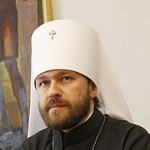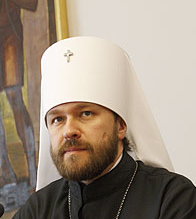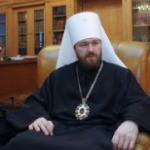Deprecated: trim(): Passing null to parameter #1 ($string) of type string is deprecated in
/home/aoiusa/public_html/wp-content/plugins/sexybookmarks/public.php on line
388
Deprecated: trim(): Passing null to parameter #1 ($string) of type string is deprecated in
/home/aoiusa/public_html/wp-content/plugins/sexybookmarks/public.php on line
394
Deprecated: trim(): Passing null to parameter #1 ($string) of type string is deprecated in
/home/aoiusa/public_html/wp-content/plugins/sexybookmarks/public.php on line
400
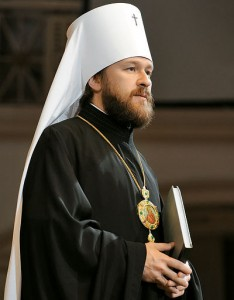 Met. Hilarion of Volokolamsk is the Chairman of the of the Department for External Church Relations Moscow Patriarchate.
Met. Hilarion of Volokolamsk is the Chairman of the of the Department for External Church Relations Moscow Patriarchate.
Key quote:
“We remain strongly convinced that the secular nature of the state does not presuppose the ousting of the Church from the public space or her marginalization and placement in a “ghetto”. The Russian Orthodox Church is not only a social institution that has played a tremendous historical role in the development of Russian statehood and formation of the Russian people’s Christian spirit, but also an important part of the modern civil society. By virtue of this fact the Church has a right to expect that her voice is heard. And now, at a time of relative wellbeing of the Church, relevant are the words of St. Tikhon, the Holy Patriarch of Moscow and All Russia, who said not long before his death, “Looking at the future ways of holy Orthodoxy without fear, we call upon you, our beloved children, do God’s cause and may the sons of lawlessness never succeed”.”
Your Eminence, Venerable Cardinal Schönborn,
Distinguished Participants in the Seminar:
We have assembled to discuss such topical issues as relations between Church and State, dialogue of Churches in the context of global migration processes, the place of religion in societal life and social service of the Church.
The subjects proposed by the organizers of the seminar for us to discuss have a direct bearing on the service of the Russian Orthodox Church today. I would like to speak in more detail about church-state relations in Russia since this theme has been heatedly debated in recent times both inside and outside Russia.
For over millennium-long history of the Russian State, relations between the Church and the secular power have developed in different ways. During almost a thousand years beginning from the Baptism of Old Russia in 988 to the 1917 Revolution, the church-state relations in Russia shaped up differently. The form and content of these relations depended to a large extent on the historical context and the personalities of supreme hierarchs and state rulers. For instance, in the period from 988 to the autocephaly gained by the Russian Church in 1488, the state promoted the propagation of Orthodox faith without interfering in internal church affairs. In the subsequent period known as the Moscow Period (from 1448 to 1589), the princely government would often violate the established balance of relations and the principle of mutual non-interference by replacing an annoying head of the Church for a more loyal one. According to the church historian Anton Kartashev, “Russian metropolitans would soon see the overpowering authority of the Moscow Prince who would appropriate the title of tsar and the ensuing Byzantine idea of patronage over all the Orthodox Christians. At the same time, the installation and fate of metropolitans themselves would begin to depend equally strongly on the personal will of Moscow princes, as was the case in ruined Constantinople”. [1]
In 1589, the Moscow Council chaired by Patriarch Jeremiah II of Constantinople installed the first Russian Patriarch Job. The model of relations between the Church and the secular power in the first patriarchal period proved to be a reproduction of church-state relations as were established in the Byzantine Empire in the form of the so-called symphony of church and state power. The introduction of patriarchal office became a logical continuation of the historical development of Eastern Christianity as the Orthodox patriarchates in the East, which were under the authority of Muslims, in the 16th century looked to the Russian Church and Russian monarchs for support and protection. The election of a Patriarch gave a special status not only to the Church but also to the supreme power of the state which finally became aware of itself as the successor of Byzantine baseliuses.
Peter I abolished the patriarchal office and initiated the so-called Synodal Period in the history of the Russian Orthodox Church. The abolishment of patriarchal office and the establishment of a Sacred Governing Synod in 1721 as in fact a ministry in the structure of governmental bodies headed by a secular person, the Chief Procurator, initiated a period of secularization and subjection of the Church to the state. It sometimes happened so that emperors would appoint as Chief Procurators persons, to put it mildly, not quite blameless not only in their morals but also in their religious views. The secularization continued under Catherine II who secularized monastery lands thus undermining their subsistence.
The year 1917 became a turning point for both the Russian Church and the whole Russian Empire as it marked the beginning of the chaos and terror of civil war of all against all. Russia saw the perfect fulfilment of the words of our Lord Jesus Christ: Brother will betray brother to death, and a father his child; children will rebel against their parents and have them put to death. You will be hated by everyone because of Me, but the one who stands firm to the end will be saved (Mt. 10:21-22).
The Local Council of 1917-1918, which was held against a backdrop of the collapse of the entire state and social order, restored once abolished patriarchal office in the Church. In 1918 the Soviet power issued a Decree on the Freedom of Conscience and the Church and Religious Societies. It asserted the principle of the Church’s separation from the state and school. Religious organizations were deprived of the status of legal entity, the right to own property and to collect donations. The first Soviet Constitution of 1918 defined the clergy and monastics as nonworking elements and denied them electoral rights. The children of the clergy were deprived of the right to enter higher education institutions. The authority in the person of Lenin and later Stalin who replaced him initiated repressions against their own people on an unprecedented scale with the toll of millions victims. The Church was almost completely crushed as bishops and priests were executed without investigation and trial, churches were blown up, monasteries and theological schools closed.
The decrees “On the Separation of the Church from the State and the School from the Church” and “On Religious Associations” adopted in 1929 put the Russian Orthodox Church outside the law. The persecutions against the clergy and faithful sometimes abated and sometimes broke out with a new force as was the case in the pre-war period and the period after World War II. The number of martyrs for faith in the Russian Orthodox Church exceeds many a time the multitude of Christian martyrs who suffered in the first centuries of persecution carried out by the heathen Roman Empire.
The political processes in the late 20th century in the USSR led to the collapse of the Soviet state. In 1990, Russia adopted “The Law on the Freedom of Conscience and on Religious Organizations”, which actually abolished the legal basis for exterminating the Church. The Council for Religious Affairs was liquidated and religious organizations recovered the legal basis for their work and the status of legal entity. The Church was given the right to own property, to engage in economic activity, to establish educational institutions for children and adults and to freely distribute religious books.
The present law “On the Freedom of Conscience and Religious Associations” was adopted in 1997 to reflect the profound changes which took place in the political and socio-economic domains of society. This law fixes a number of fundamental provisions in the field of cooperation between the state and religious communities. An analysis of the legal novels in this law shows that Russia has chosen for relations between the state and religious organizations a model different from that of “Established Church” prevailing in the world. The law has developed the basic principles of church-state relations fixed in the 1993 Russian Constitution.
In 2000, the Bishops’ Council of the Russian Orthodox Church adopted an important document, “The Russian Orthodox Church’s Basic Social Concept”, which, among other things, contains results of a theological reflection on church-state relations in the past and the present. I will dot down the key statements, which make it possible to come to a better understanding of the Church’s stance on this issue.
First, the Church recognized that the state is a necessary element of life in the world corrupted by sin, where both the individual and society need to be safeguarded against dangerous manifestations of sin. The state, however, is not an end in itself or an independent value but rather an instrument for restricting the domination of sin in the world. The Old and New Testaments call those in power to use the power of the state to restrict evil and to support good as the apparent moral sense of the state’s existance (for instance, Rom. 13:1-7; 1 Pet. 13-16). We know from church history that the apostles taught Christians to obey the authorities (cf. Tim. 2:2), although at that time the Church was persecuted by both the local Jewish authorities and the Roman Empire. The Church keeps loyal to the state, but to stand above the requirement of loyalty is God’s commandment to do the work of people’s salvation in any conditions and circumstances.
Secondly, Christians should avoid absolutizing power and understand its limits. They should recognize its earthly and temporal value called forth because of the existence of sin in the world and the need to contain it. The authority that drives God away from its conscience is prone to abuses and even the deification of rulers themselves as numerous historical examples have shown.
Thirdly, the nature of the state and that of the Church differ. The Church is founded directly by God Himself, our Lord Jesus Christ; while the divine institution of state authority is revealed in historical process only indirectly. While the goal of the Church is salvation of people for eternal life, the aim of state is to ensure their welfare on earth here and now. The state is an immanent part of “this world”, while the Kingdom of God where Christ will be “all and in all” (Col. 3:11) has no room for coercion, opposition between the human being and God and, accordingly, no need for the institution of state.
Fourthly, the church consciousness asserts that temporal wellbeing is unthinkable without respect for certain moral norms. For this reason, the tasks and work of the Church and state may coincide in this area. The state is capable of either giving the Church an opportunity for carrying out her mission or restricting this opportunity up to open persecution. The authority thus judges itself in face of the Truth and ultimately foretells its own fate.
Fifthly, from the Church’s perspective, the secular nature of a state does not have to mean the need to expel religions from every sphere of societal life, to remove the Church from participation in solving socially significant problems or to deprive her of the right to give her assessment of actions taken by the authority. The Church is an important institution of the civil society and she has a right to expect that her voice is sounded and heard. In particular, the Church has a right “to point out to the state that it is inadmissible to propagate such convictions or actions which may result in total control over a person’s life, convictions and relations with other people, as well as erosion in personal, family or public morality, insult of religious feelings, damage to the cultural and spiritual identity of the people and threats to the sacred gift of life”.[2] The principle of church-state separation in today’s situation presupposes only the division of terms of reference between the Church and the authorities and non-interference in each other’s internal affairs.
Sixthly, the Church should not take upon herself the functions inherent in the state, namely, to oppose sin by violence, to make use of temporal powers and to assume restrictive or coercive functions of the state power. At the same time, the Church can request or appeal to the authority to use these functions of the state in particular cases.
Finally, in carrying out her social, charitable, educational and other socially significant projects, the Church expects assistance and promotion from the state. The areas of cooperation between church and state are vast and include, among other things, support for the institution of family, motherhood and childhood, religious-ethical and patriotic education and formation, social work, service in prisons, humanitarian studies, work in the field of culture and art and peacemaking on international and national levels.
The above provisions enable the Russian Orthodox Church to carry out her service in today’s society and to develop dialogue with the state power.
Today, members of the Russian Church are actively involved in various projects carried out by the Church both on her own and jointly with societal and public structures in various fields. The Church and the governmental institutes constructively work and consider debatable problems together. The Church has an opportunity to bear witness to the Gospel’s truth before both the people and the authorities and to express her position on socially significant issues standing on both Russian and global agenda.
As an example of dialogue between church, society and state in education, I can cite the project for teaching the Basics of Religious Cultures and Secular Ethics discipline in all Russian regions. In our country there is a legal provision for teaching in public schools the disciplines devoted to the study of moral principles and historical and cultural traditions of Orthodoxy and other world religions or, alternatively, for teaching secular ethics. Parents are given the right to chose one of these disciplines within this course.
The first practical steps have been made to revive the army clergy. At present, there are 240 vacancies for staff priests, and 814 non-staff priests serve in the Russian Army Forces. [3]
The Russian Church is actively involved in social service. Orthodox church asylums and orphanages are established; aid to old people, the disabled and homeless is given; assistance is given in the treatment and rehabilitation of those dependent on alcohol and drugs and in restoration of their social relations and work skills.
Almost in all the dioceses of our Church, their ruling bishops have appointed clergy to take pastoral care of inmates of penitentiaries. Today, 905 priests serve in them.
The Russian Church is active in presenting her position on topical issues of today in the UN, Council of Europe, Organization for Security and Cooperation in Europe and other international organizations. She attaches a special importance to the strengthening of relations with governmental bodies and the civil society in other countries (including through contacts with the diplomatic corps accredited in Moscow). The aim of these efforts is to inform people in other countries of the Church’s position on burning issues having the ethical dimension. Among them the problems of euthanasia, abortion, legalization of same-sex unions and trafficking of people.
The revival of the Church and the expansion of her work, her growing authority in society and cooperation with the state in diverse areas have provoked displeasure in certain social circles. There are censures in the mass media for the Church’s “interpenetration with the state”, “clericalization of society”, and the like. His Holiness Patriarch Kirill of Moscow and All Russia, in his address to the Bishops’ Council in 2013, reminded the public once again that “the Church does not interfere in the affairs of state governance, and the state does not interfere in the affairs of the Church but both work together for people’s benefit”. [4]
We remain strongly convinced that the secular nature of the state does not presuppose the ousting of the Church from the public space or her marginalization and placement in a “ghetto”. The Russian Orthodox Church is not only a social institution that has played a tremendous historical role in the development of Russian statehood and formation of the Russian people’s Christian spirit, but also an important part of the modern civil society. By virtue of this fact the Church has a right to expect that her voice is heard. And now, at a time of relative wellbeing of the Church, relevant are the words of St. Tikhon, the Holy Patriarch of Moscow and All Russia, who said not long before his death, “Looking at the future ways of holy Orthodoxy without fear, we call upon you, our beloved children, do God’s cause and may the sons of lawlessness never succeed”.
Author’s notes:
[1] Kartashev A. V. Essays on the History of the Russian Church. Sretensky Monastery, 2009, v. 1, p. 394 (Russian)
[2] Bases of Social Concept. https://mospat.ru/en/documents/social-concepts/iii/
[3] Report by His Holiness Patriarch Kirill to the Bishops’ Council of the Russian Orthodox Church (2 February, 2013), p. 58. http://www.patriarchia.ru/db/text/2770923.html.
[4] Ibid. p. 47.
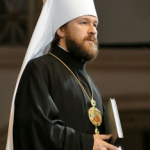
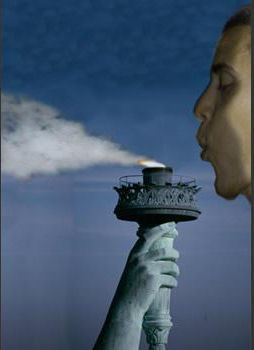 Secularization disguised as democratization released a colossal energy of subordination to power in the European states.
Secularization disguised as democratization released a colossal energy of subordination to power in the European states.
 Moscow, July 24, Interfax – Modern Western states move to absolute dictatorship, head of the Department for External Church Relations of the Moscow Patriarchate Metropolitan Hilarion believes.
Moscow, July 24, Interfax – Modern Western states move to absolute dictatorship, head of the Department for External Church Relations of the Moscow Patriarchate Metropolitan Hilarion believes. 